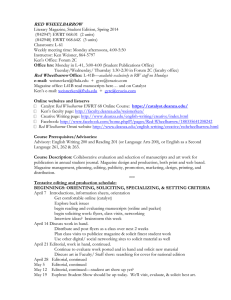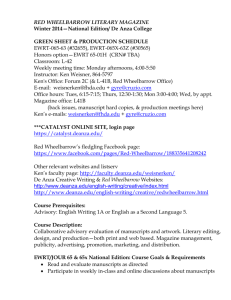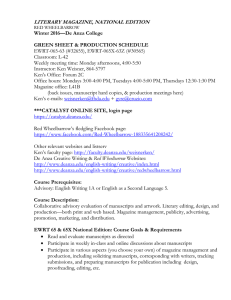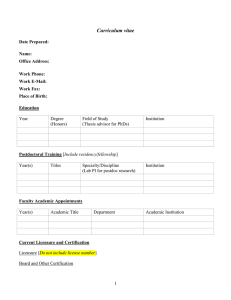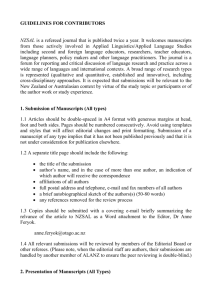Red Wheelbarrow Spring 2015 Course Greensheet
advertisement
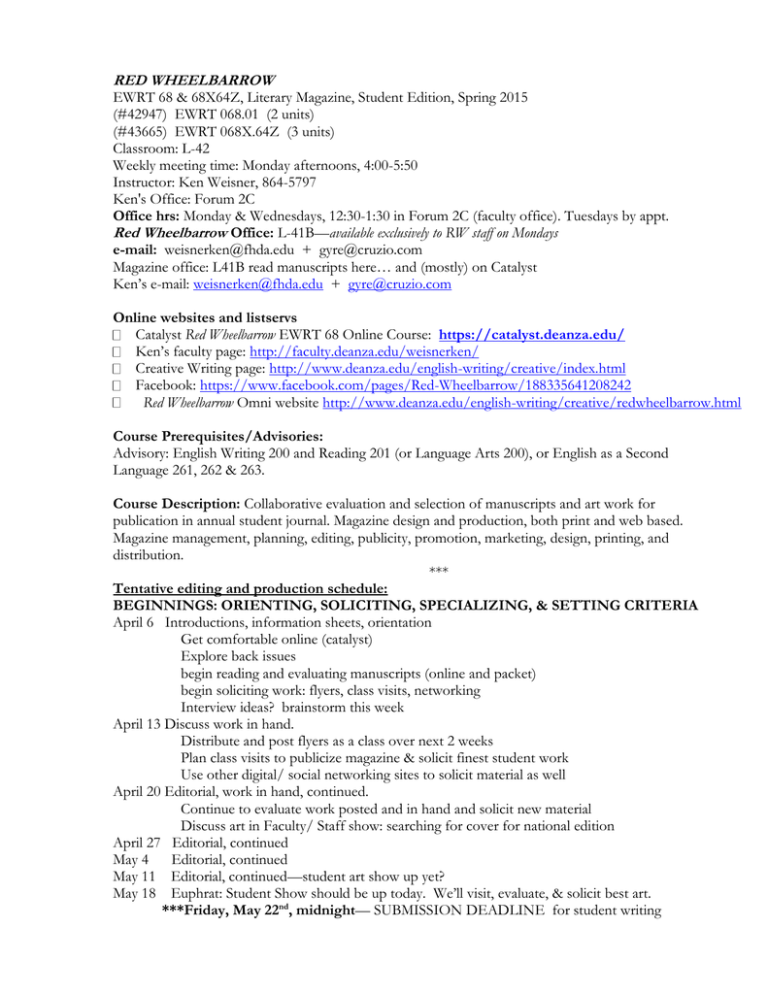
RED WHEELBARROW EWRT 68 & 68X64Z, Literary Magazine, Student Edition, Spring 2015 (#42947) EWRT 068.01 (2 units) (#43665) EWRT 068X.64Z (3 units) Classroom: L-42 Weekly meeting time: Monday afternoons, 4:00-5:50 Instructor: Ken Weisner, 864-5797 Ken's Office: Forum 2C Office hrs: Monday & Wednesdays, 12:30-1:30 in Forum 2C (faculty office). Tuesdays by appt. Red Wheelbarrow Office: L-41B—available exclusively to RW staff on Mondays e-mail: weisnerken@fhda.edu + gyre@cruzio.com Magazine office: L41B read manuscripts here… and (mostly) on Catalyst Ken’s e-mail: weisnerken@fhda.edu + gyre@cruzio.com Online websites and listservs Catalyst Red Wheelbarrow EWRT 68 Online Course: https://catalyst.deanza.edu/ Ken’s faculty page: http://faculty.deanza.edu/weisnerken/ Creative Writing page: http://www.deanza.edu/english-writing/creative/index.html Facebook: https://www.facebook.com/pages/Red-Wheelbarrow/188335641208242 Red Wheelbarrow Omni website http://www.deanza.edu/english-writing/creative/redwheelbarrow.html Course Prerequisites/Advisories: Advisory: English Writing 200 and Reading 201 (or Language Arts 200), or English as a Second Language 261, 262 & 263. Course Description: Collaborative evaluation and selection of manuscripts and art work for publication in annual student journal. Magazine design and production, both print and web based. Magazine management, planning, editing, publicity, promotion, marketing, design, printing, and distribution. *** Tentative editing and production schedule: BEGINNINGS: ORIENTING, SOLICITING, SPECIALIZING, & SETTING CRITERIA April 6 Introductions, information sheets, orientation Get comfortable online (catalyst) Explore back issues begin reading and evaluating manuscripts (online and packet) begin soliciting work: flyers, class visits, networking Interview ideas? brainstorm this week April 13 Discuss work in hand. Distribute and post flyers as a class over next 2 weeks Plan class visits to publicize magazine & solicit finest student work Use other digital/ social networking sites to solicit material as well April 20 Editorial, work in hand, continued. Continue to evaluate work posted and in hand and solicit new material Discuss art in Faculty/ Staff show: searching for cover for national edition April 27 Editorial, continued May 4 Editorial, continued May 11 Editorial, continued—student art show up yet? May 18 Euphrat: Student Show should be up today. We’ll visit, evaluate, & solicit best art. ***Friday, May 22nd, midnight— SUBMISSION DEADLINE for student writing May 25 HOLIDAY—vote online (vital to read & respond—even though no class) June 1 Editorial: Making final choices, part 1 *June 1-10 Final editorial and art decisions. Order and design decisions. This is our intense production time. Save up extra hours to help. In the theater, they call this “hell week.” June 8* Regular class period: making final choices, part 2—also production, and proofreading *Extra meetings (attend the ones you are able to attend…it’s voluntary. Wednesday, June 3rd, 4-5:45, in classroom (editorial & design) Wednesday, June 3rd, 6-10:00, (location TBA) (editorial & design) (pizza) Monday, June 8th, 6-10 (after class in L-41) (editorial, design, proof, pizza) Wednesday, June 10th, 4-5:45 (location TBA) (proofreading) Wednesday, June 10th, 6--??? (location TBA) (proofreading) (pizza) ***June 11 Book should be uploaded to printer for us to stay on production schedule. June 15th Send out final acceptances, "rejects.” Plan party/reading. June 22nd Last class—prepare for reading and celebration/announce contest winners Monday, June 22nd, our final exam time (4-6): prepare for publication celebration in L-61 and/or L-41. Wednesday, June 24, 6:15-8:15, host publication event in Fireside Lounge, Campus Center. ******* EWRT 68 & 68X Course Culture, Course Goals—and Requirements: Greetings & welcome to EWRT 68 a.k.a. “the making of a literary magazine from start to finish in three months.” We did it last year; we did it the year before… and the year before that… and we’ll do it again this year. But it’s not easy. In fact, it’s always an adventure. Our goal is to have the book in hand for finals week (our big day is Wednesday, June 24th). All student edition manuscripts will be anonymous——names removed. Manuscripts will be logged in with a number instead of a name. We can refer to the pieces by number and by title and by other stuff like you know “the one about the flying cow,” etc. All manuscripts are logged-in by instructor or managing editor. Staff members should read all student submissions and rank them as “yes,” “no,” or “maybe” after initial read. You can also use a 1-5 scoring system: where five is terrific, 4, is quite good, 3 is OK, 2 is substandard, and 1 is poor (or worse). Substantive comments are especially useful since they will jog your memory during class discussion of submissions. Paper comment/rating are sheets are available for hard copy submissions in L41B. For those submissions, write all comments on the outer envelopes and comment sheets. Reminder: please don’t accidentally write on an original manuscript (unless we have already agreed to ask for revisions and are working on the manuscript with revision in mind). Posting comments to the Catalyst site is required. Three-unit students are asked to respond to every manuscript posted, particularly in your genre of specialization. Two-unit students are asked to respond online to a minimum of 5-7 pieces per week, ideally these will be pieces they recommend for publication. Some students will make special arrangements with the instructor to focus on a particular genre. Electronic submissions are encouraged— greatly preferred. We log them in, print out one copy for the office (and for use in meetings), and then post the piece on catalyst. L-41B, the Red Wheelbarrow Office, is our office exclusively on Mondays (other weekdays, we share the space with those who work on La Voz, the student newspaper). You are always free to use computers in that office to read manuscripts posted in Catalyst. Hard copy manuscripts placed in the wire basket in the L41 office are pieces we probably plan to discuss that afternoon in class. Feel free to come in at any time and work in L41B. Please read and prepare for Monday meetings—and comment on the work—especially all work in your genre area if you are specializing. Please don’t remove manuscripts from the office without special permission. This may sound obvious, but please do not to be overly flip or cavalier in your assessments of work; the work we are evaluating could easily be from one of us on the staff or from someone’s friend. Unfavorable evaluation need not be mean or sarcastic. In fact, evaluative work is a fun, important task requiring respect for truth, for art, for craft, for process—and for one another. When our own work is being discussed, we don’t let on. Like all writers through eternity, we keep our hopes sky high but also stay prepared to wallpaper our rooms with rejection slips. On Monday afternoons during class, we will focus on discussing “yeses” and "maybes"— the best poems, stories, plays, etc., from the wire basket or from online. Votes are taken after plentiful discussion; everyone gets an equal vote. Up through May 18th, we can still vote to put work back into the maybe pile, ask for revisions—or put off tough decisions. But May 18th (or thereabouts) is the day of reckoning: only yeses and nos after that, or very specific revision requests. Notice that the submission deadline is Friday, May 22nd by midnight. Please do tell your friends to send work, and absolutely submit some yourself! Encourage everyone to send work early. Our first job as a group is to get out there and solicit work! Tell your writer-friends that the bestcase scenario for submissions is email. Eligibility: any De Anza student (who has attended De Anza for at least one class during one quarter of the 2014-15 academic year) is eligible to submit work. Guidelines: students may submit up to five poems; one short story of up to 5,000 words (20 pages) or three “short shorts”; one play or screenplay (5,000 words); up to five black and white prints or b/w digital files for photographs or drawings (.tif, .gif, .psd, or .jpg fine; for color cover, at least 300 dpi); up to one b/w comic strip; a book review of up to 1,250 words; or any other creative text or image that you can imagine and I’ve left out here. Cover images can be color—interior art needs to be graphically interesting in black & white although we may decide to print an interior color-art folio this year, depending on cost. We will also publish the winner of the Carolyn Keen literary essay prize (for the best critical essays about literature this academic year by a De Anza student), and we award 1st, 2nd and 3rd cash prizes to the best student writers in poetry, fiction, and art at our end-of-quarter reading/celebration (these awards are also judged anonymously, by an outside panel). Bring your own creative thoughts and suggestions to the table. We want to involve De Anza literary and artistic talent in any feasible way. Got any ideas? Maybe a writer you are reading or who is visiting campus—who we could interview? Let's have a great quarter and make a terrific magazine. You are serving De Anza artists, writers, and their families—and enriching our community, as well as creating an archive of our imaginative work. Thanks for that! —kw Description of areas you may wish to participate/ specialize in. On reverse, check (√) all areas of interest. Asterisks (*) for areas of extra special interest. Managing: Help log in submissions; call votes when needed; help determine what to vote on a given day. Read all submissions. Make sure votes are recorded & uploaded. Poetry Editor: Call and keep track of poetry votes. Coordinate with managing editor to post result to Catalyst. Be especially prepared in your chosen genre. Fiction Editor: Call and keep track of fiction votes. Coordinate with managing editor to post result to Catalyst. Be especially prepared in your chosen genre. Art Editor: Cover search (artist from our area—propose front and back cover designs). Call and keep track of art votes. Coordinate with managing editor to post result to Catalyst. Be especially prepared in your chosen genre. Screener: If we're inundated by submissions, you’ll read incoming manuscripts to decide which the class should read, discuss, and vote on. Usually more for National Edition logjams. Interview team : including questioning, recording, transcription, &/or editing. We'll see what develops; this may or may not happen. Soliciting work: contacting and soliciting work from student writers and artists. Class visits. E-mails. Flyer distribution. Follow through. Production & Book Design: L-41 lab; ongoing, but intensive end of May, first half of June. Proofreading/ Copy Editing: ongoing; intensive & required in June. Publicity: Creating a buzz around this magazine, this program, & this course. Web design and management; Facebook maven; or online journal designer: The sky’s the limit. We are somewhere between pathetic and fledgling in the first two categories, and non-existent in the third. We need you. Great for honors credit or second unit. Marketing/ Distribution/ Circulation: back issues, subscriptions—national & student editions. Contest coordinator: Help with League for Innovation prize publicity. Reading/Event Coordinator: June 24th Launch event coordinators, Emcees, publicists. CD/ DVD/ Camera Work/ Audio production: If we want to feature any spoken word or record audio or video for the website—you’d work on those activities. Creative Non-Fiction/ Book Review/ Symposium Editor: Topic to be announced. You help solicit and edit/ organize a symposium of short commentaries on the poems of this wonderful local writer who died too young last year. Or—don’t be afraid to propose your own topics. Other: _____________________ RED WHEELBARROW— Editorial Staff Information Sheet — Spring 2015 Your name ____________________ E-Mail ________________________ EWRT 2 Units 3 Units Telephone _____________________ Areas you may wish to participate/ specialize in: Check (√) all areas of interest. Asterisks (*) for areas of extra special interest. Managing: Poetry Editor: Fiction Editor: Art Editor: Screener: Interview team (questioning, recording, transcription, &/or editing): Soliciting work: Production & Book Design: Proofreading/ Copy Editing: √ Publicity: Web design and management, Facebook maven, &/or online journal designer: Marketing/ Distribution/ Circulation: Contest coordinator: Reading/Event Coordinator: CD/DVD production: Creative Non-Fiction/ Book Review/ Symposium Editor: Other: _____________________
